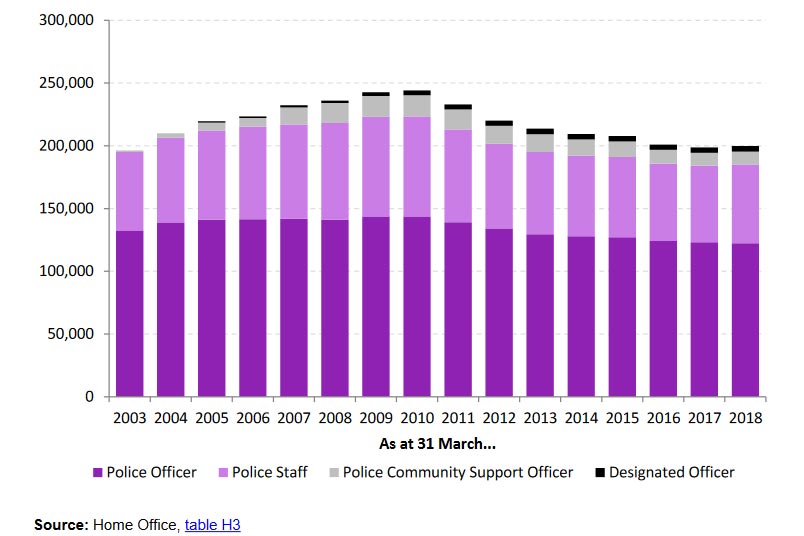Tackling Scams by tackling Loneliness
Sunday, September 23rd, 2018
September 11th saw the National Audit Office (NAO) conclude that the Home Office does not know whether the police system in England and Wales is “financially sustainable” following widespread funding cuts. On the same day, Commissioner of the Metropolitan Police Service Cressida Dick, described the decision to give police a 2% rise “a punch on the nose”; and NatWest community banker Sarah Thompson held a Friends Against Scams event at Chesham Library.
What’s the connection? All highlight pressures on policing, and the need for strong communities, taking actions themselves to enhance their strength and safety.
In addition to its role as a statutory platform for setting neighbourhood policing platforms, that’s what the Chiltern Community Forum is all about.
Policing Trends by Numbers
The National Audit Office’s conclusions were hotly debated, but the numbers reported were arresting:
- Central government’s direct funding for Police Commissioners (who receive all funding related to policing and crime reduction) reduced by 30% between 2010-11 and 2018-19 in real terms; this is the figure for Thames Valley.
- Since 2015-16, an increasing proportion of central government funding each year has been reallocated to fund national priorities.
- Local funding, including council tax contributions and the local council tax support grant, has risen proportionately: 36% of forces’ total funding in 2018-19, up from 26% in 2010-11.
- For Thames Valley, 55% of funding in 2018-19 comes from central government, with 45% from local funding. (Totals for England and Wales is 64%/36%.)
- Including central government and local funding, Thames Valley Police funding has fallen by 15% in real terms between 2010-11 and 2018-19.
- The main way that police forces have managed financial pressure is by reducing the size of their workforces. Forces reduced the total size of their workforce by 18% from March 2010 to March 2018, including a 40% fall in police community support officers.
- Service metrics have suffered: time taken charge an offence has increased, arrest rates have fallen, ‘proactive work’ has fallen and crime survey stats show a rise in dissatisfaction of victims.
Police Workforce in England and Wales 2003-2018
Isolation and loneliness: a breeding ground for scams
The presentation and discussion on scams and scam awareness covered a range of scams. Many will be familiar to most of us.
We’ve probably all received uninvited approaches by email, letter, and telephone or in person. Often they will involve fake lotteries, deceptive prize draws or sweepstakes, clairvoyants, computer scams, and romance scams. Bogus callers, rogue traders and unscrupulous sales people will knock on doors, looking to target vulnerable people with scams.
At an individual level, those who consider themselves savvy will look to keep themselves as safe as possible, but what about those more vulnerable?
Fraudsters scammed nearly 49,000 older people across the UK in the past year, equivalent to almost six reports every hour.
But one expert said the true number of elderly victims was likely to be in the millions.https://t.co/MuyT0Zefo8 pic.twitter.com/zyh9MqPwVU— Trading Standards (@Bucks_SurreyTS) 24 September 2018
What was especially striking from the presentation was the role played by loneliness, particularly of the elderly, in making people vulnerable. Those without regular human contact may be more inclined to respond to initial contact; they may be less able to resist overtures; they may lack contact with friends, neighbours and networks to advise them. And it is very common that those who fall victim, feel a deep sense of humiliation which prevents them sharing or reporting their experience.
In short, isolation and loneliness are a breeding ground for scams. By taking steps to tackle isolation, communities can make themselves and their residents more resilient.
Across our area there are various initiatives to this end. The Community Safety team at Chiltern District Council can help with Neighbourhood Watch schemes. Bucks CC’s Street Association scheme is specifically aimed at bringing together local residents who want to make their community stronger, friendlier and more supportive. The Street Association model in Buckinghamshire has been developed with funding from the Police and Crime Commissioner. Look out also for local clubs and events which offer opportunities to support community resilience through social contact.
For comprehensive information on how to recognise a scam, what to do, how to spot signs that others may be at risk, we recommend that you visit Friends Against Scams. This National Trading Standards Scams Team initiative aims to protect and prevent people from becoming victims of scams by empowering communities to Take a Stand Against Scams.
Another invaluable resource on scams is Buckinghamshire & Surrey Trading Standards. Link to page on rogue traders scams and cold callers.
Finally, enjoy this engaging video from ActionFraud and Age UK, with pointers on how to deal with unwanted visitors at your front door.
Note their checklist: STOP – CHECK – ASK – MINE – SHARE.
RT @actionfrauduk "We’re incredibly proud to team up with @age_uk to produce this video to give older people the power to say NO to doorstep fraudsters!
You can do your bit by sharing this vid and then #tell2 of your friends or family. pic.twitter.com/y0AiQqDx8H"
— Trading Standards (@Bucks_SurreyTS) September 24, 2018
To report a scam or suspicious activity please contact Action Fraud on 0300 123 2040 or visit https://www.actionfraud.police.uk/report_fraud
Other Recent Posts
Anyone can fall for an AI voice clone
Thursday, September 19th, 2024
Using voice cloning technology, scammers replicate voices, which can be used to dupe a person into sending money. James Nesbitt and Starling Bank have joined forces to promote the ‘Safe Phrases’ campaign. Watch the video. Read More...
Deepfake Videos – could you spot one?
Tuesday, August 13th, 2024
Understanding threats and taking appropriate actions, is by far the best approach to keep ourselves safer from frauds and scams. Nowhere is this more true than in the case of ‘deepfake’ videos. Read More...
Are you ‘oversharing’ on Social Media?
Tuesday, August 6th, 2024
Do your social media posts give away too much to potential fraudsters? A though provoking video, and a leaflet from getsafeonline.org providing tips and advice on guarding against oversharing online. Read More...
New Police and Crime Plan 2024-2029
Tuesday, August 6th, 2024
Thames Valley Police and Crime Commissioner Matthew Barber has published his Police and Crime Plan 2024-2029. This is grouped aroud three main themes – ‘Protecting Communities’, ‘Protecting People’ and ‘Protecting Property’. Read More...
Free webinar – Staying safe from scams, artificial intelligence (AI) fraud & cybercrime
Saturday, July 13th, 2024
Free webinar, for advice on how to spot a scam, how to report one and the ways you can protect yourself and others against them. Tuesday 16th July 2024 10:00am – 11:30am, via Microsoft Teams. Read More...
How we can help tackle industrial-scale Fly Tipping
Thursday, July 4th, 2024
Illegal waste activity is a massive cost to the economy and environment, often perpetrated by organised criminals. TVP, the Environment Agency and Buckinghamshire Council has had some significant successes recently. Read More...








